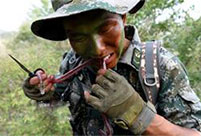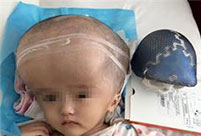

 |
July 7, 2015, the first day of summer holiday, 13-year-old Lingxiao and 10-year-old Chunhao went swimming in the river of Pangzhai village, Henan province, yet they never came back. When villagers eventually found their bodies in the river, they were still holding hands.
In recent years, several similar tragedies have shed light on the plight of “left-behind children”, whose migrant-worker parents leave them to the care of relatives, often grandparents, or even themselves. As urbanization drives millions of migrant workers into large cities in China, the question remains to be asked: who is to take care of their children left behind in the villages?
According to statistics from the All China’s Women’s Foundation, there are 61 million such “left-behind children” in China, among them, around 30 million children are under the age of 18 but have no parents at home to take care of them. Meanwhile another 2 million manage to live by themselves with no adult guardians.
These figures more often than not turn into heart-wrenching consequences in real life, as such children are left extremely vulnerable to crimes and accidents.
Chen Ruixue, 12, drowned on June 14 in Dengzhou, Henan province, in an effort to save her little brother who fell into the water. This pair of siblings was left to the care of their grandmother, as their parents were working in Jiangsu.
On June 11, one elder brother and his 3 little sisters died at home drinking pesticide in Cizhu village, Guizhou province. Their mother was missing. Their father migrated to work in a big city, and police failed to get in touch with him. They were left to the care of the late elder brother, 13 years old. It is yet to investigate whether it was a group suicide or murder.
Five girls under 14 were molested and raped by their teacher in Xiangxiang, Hunan province, in 2014. One of them wrote to beg her parents to come home from Guangzhou, a southern boomtown in China. It was only then did the parents realize something was wrong.
Five boys were suffocated in a trash bin where they tried to light fire against coldness in Bijie, Guizhou province, on November 11, 2012. They were neighborhood kids, who, for various reasons, unattended by their parents and roamed around the streets in the middle of wintry night.
Besides crimes and accidents, these “left-behind children” are suffering from a lack of education, developmental delays, starvation, domestic violence from relatives, and so on.
Observers here noted that the fundamental cause of this social phenomenon is the huge gap between the rich and the poor, and the differences between urban and rural areas. With China’s rapid economic growth mainly in big cities and coastal areas, this group of “left-behind children” has aroused attention from both the government and the society.
 PLA soldiers eat raw snake meat in harsh training
PLA soldiers eat raw snake meat in harsh training Doctors use 3D-printed skull to save girl
Doctors use 3D-printed skull to save girl Yunnan-Myanmar Road: The past and present
Yunnan-Myanmar Road: The past and present Campus belle of Xiamen University gets popular online
Campus belle of Xiamen University gets popular online Who says moms cannot be trendy and hot?
Who says moms cannot be trendy and hot? 10 Chinese female stars with most beautiful faces
10 Chinese female stars with most beautiful faces Stunning photos of China's fighter planes
Stunning photos of China's fighter planes Eight fruits that defend men's health
Eight fruits that defend men's health  Top 10 secrets of longevity
Top 10 secrets of longevity Investors worried about impact from futures
Investors worried about impact from futures Accusations over GDP figures are frivolous
Accusations over GDP figures are frivolous Dream jobs: wiped workers recharge with power naps
Dream jobs: wiped workers recharge with power naps Chinese man throws birthday pool party for pet sea lion at luxury hotel
Chinese man throws birthday pool party for pet sea lion at luxury hotelDay|Week